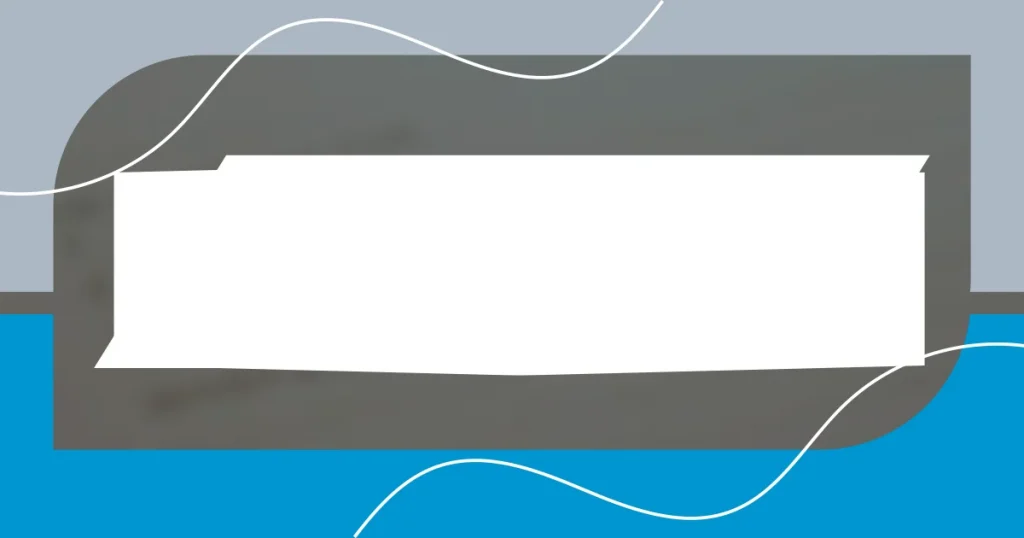Key takeaways:
- Establishing a balance between writing and personal life is crucial for creativity; boundaries and self-care enhance productivity.
- Implementing clear, SMART writing goals and a dedicated schedule helps streamline the writing process, transforming tasks into manageable milestones.
- Regular reflection and adaptability in writing practices allow for continuous improvement and personal growth, fostering a more fulfilling creative journey.

Understanding writing and life balance
Finding a balance between writing and life can feel like walking a tightrope. There have been times when I was so engrossed in meeting a deadline that I neglected a planned dinner with friends. It made me realize how important it is to set boundaries—not just for writing, but for the personal connections that nourish my creativity.
I often think about how writing isn’t just an isolated task; it’s woven into the fabric of my everyday experiences. When I take a walk or engage in a hobby, I find inspiration that enriches my writing. It raises the question—are we truly being productive if we’re burning out? Embracing downtime is essential for sparking new ideas and maintaining passion for the craft.
Sometimes, I catch myself in a whirlwind of deadlines, and I have to pause and ask, “Is my writing benefiting from this madness?” Reflecting on my priorities helps me streamline my schedule. I’ve learned that integrating moments of self-care and relaxation can revitalizing, leading to more meaningful writing sessions. Balance, in my experience, isn’t about perfection; it’s about the rhythm between productivity and rejuvenation.

Setting clear writing goals
Setting clear writing goals has been a game changer for me. Early on, I struggled to find focus amid the chaos of life, often staring blankly at my computer screen. I remember a particularly chaotic week when I decided to list out my writing objectives. Suddenly, my motivation soared; I could visualize my path forward, making each task feel manageable. Creating SMART goals—Specific, Measurable, Achievable, Relevant, and Time-bound—has been a powerful framework that keeps me aligned with my intentions.
Here are some effective strategies I’ve found helpful in setting clear writing goals:
- Define what success looks like: Is it a finished draft or a certain word count each day?
- Break it down: Divide larger projects into smaller, actionable steps.
- Set deadlines: Give yourself a timeline to create a sense of urgency.
- Track progress: Use a journal or app to mark off accomplishments regularly.
- Adjust as needed: Life happens, so be flexible with your goals to keep your momentum going.
By implementing these strategies, I’ve noticed a shift in how I approach my writing, turning daunting tasks into achievable milestones.

Creating a dedicated writing schedule
Creating a dedicated writing schedule has been transformative for my creative process. I remember when my writing time felt sporadic; I’d squeeze in a few sentences whenever I could, often feeling frustrated. Now, I’ve carved out specific blocks of time in my day devoted solely to writing. This non-negotiable schedule has helped me tap into a flow state, where words come naturally and ideas flourish.
I also noticed that setting a consistent writing time fosters a sense of commitment to my craft. For example, I decided to wake up an hour earlier each day to dedicate to my writing. Initially, those early mornings were challenging, but as I persisted, I found that this quiet time became Precious. It’s interesting how much more I can accomplish when I treat my writing time as sacred, just like any important meeting. I encourage you to find those slots that work best for you, whether it’s early mornings, lunch breaks, or late nights.
Lastly, incorporating breaks within my writing schedule has made a remarkable difference. There are days when I need to step away, breathe, and gain a fresh perspective. By allowing these mental resets, I feel less pressured and more focused when I return to my writing. Have you ever felt drained from writing too long? Trust me; it’s worth it to listen to your mind and body. You’ll be surprised at how clarity emerges when you give yourself that little pause.
| Dedicated Writing Schedule | Description |
|---|---|
| Time Blocking | Designate specific times each day solely for writing. |
| Consistency | Set a reliable writing routine that fits your lifestyle. |
| Incorporate Breaks | Allow for restorative pauses to enhance your creativity. |

Prioritizing self-care and well-being
Prioritizing self-care and well-being has become a crucial pillar in my writing journey. There was a time when I pushed myself relentlessly, believing that more hours at the keyboard equaled better results. I vividly recall a week spent hunched over my laptop, fueled by coffee and stubbornness, only to end up feeling exhausted and uninspired. It hit me then—our minds and bodies are our greatest assets in creativity, and neglecting them leads to burnout. Have you ever found yourself in a similar cycle of exhaustion? It’s a reminder that taking a step back can be just as valuable as pushing through.
I’ve learned to integrate self-care into my daily routine in practical ways. For instance, I established a non-negotiable rule to take breaks that involve going for a walk or practicing mindfulness. I remember one sunny afternoon when I chose to spend 20 minutes outside instead of writing. That brief escape allowed me to return to my desk with fresh eyes and renewed inspiration. It’s fascinating how nature and movement can spark creativity, don’t you think? It’s essential to give ourselves permission to disconnect, even if just for a moment.
Ultimately, finding balance means being kind to myself. I try to schedule downtime alongside my writing sessions, treating it as part of my creative process. On particularly busy days, I’ll set aside time to indulge in a hobby, whether it’s painting or reading a good book. Reflecting on this, I realize that nurturing all aspects of life—not just the writing—is what fuels my creativity. How do you incorporate self-care into your own routine? Embracing these practices has been transformative, not just for my writing but for my overall well-being.

Establishing a supportive environment
Establishing a supportive environment is essential for my writing journey. When I first started taking my writing seriously, I noticed that my physical space greatly impacted my focus. A cluttered desk felt chaotic and often pulled my attention away from my words. So, I took the time to create a dedicated writing nook that embraced calmness and creativity. It’s amazing how simply rearranging my workspace—adding a few plants and some inspirational quotes—transformed my mindset. Have you ever thought about how your surroundings influence your creativity?
Beyond the physical space, emotional support plays a significant role. I’ve been fortunate to have close friends and family who genuinely encourage my writing endeavors. I remember sharing a piece I was particularly proud of with a friend and watching her eyes light up as she read it. That moment of validation was powerful; it reminded me that sharing my work can foster a sense of community. How could you cultivate supportive relationships in your writing life? I find that connecting with fellow writers—whether through local meetups or online groups—creates a warm environment where ideas flourish and feedback is constructive.
Furthermore, setting boundaries around my writing time is crucial in creating that supportive bubble. There was a time when I felt guilty for asking my family to respect my writing hours, thinking I should be more available. But, I soon realized that allowing myself uninterrupted time not only benefited my writing but also made me more present when I was with them. It’s a balancing act; do you struggle with this too? Using a simple sign on my door to indicate “writing in progress” fosters respect for that time. Establishing these boundaries creates a culture of understanding, making it easier for me to dive deep into my writing with fewer distractions.

Using productivity techniques effectively
Using productivity techniques effectively begins with finding what truly works for me. I’ve experimented with various methods, from the Pomodoro Technique—a time management system where you work for 25 minutes and take a short break—to batching similar tasks together. Each time I tried a new approach, I pay attention to how I felt and whether I was more focused or creative. Have you ever noticed how certain techniques might align perfectly with your energy levels? For example, I’ve found that using time blocks aligned with my peak productivity hours allows me to accomplish more in less time, which feels incredibly rewarding.
Another key aspect is the art of prioritization. I often start each day by jotting down my top three writing goals. It’s like shining a light on what truly matters, pulling my focus away from distractions. I recall a particular day when I was overwhelmed by various tasks, but by narrowing my objectives, I surprised myself with how much I achieved. Instead of succumbing to that familiar wave of anxiety, I felt empowered. Do you experience the same clarity when you set clear intentions at the beginning of your day? This practice has not only improved my productivity but has also brought a sense of accomplishment I once lacked.
Lastly, nurturing accountability can elevate how I apply productivity techniques. Recently, I joined a writing group that meets weekly to share our progress and challenges. Having regular check-ins adds a layer of commitment I hadn’t anticipated. I remember feeling a push to complete my draft before our meeting, which helped me evaluate whether I was utilizing my time effectively. Isn’t it fascinating how sharing our goals can amplify our motivation? For me, this sense of camaraderie transforms solitary writing into a collaborative journey, pushing me to be more productive and engaged in my craft.

Reflecting on progress and adjustments
Reflecting on my progress involves taking a moment to look back at where I started. I remember my early days of writing when I had no clear direction and often felt lost in the chaos of ideas. It’s incredible how jotting down my achievements, big or small, helps me see my growth over time. How often do we overlook the small wins? I cherish that feeling of revisiting old drafts, cringing at some mistakes but also appreciating how far I’ve come. It’s humbling and motivates me to keep pushing forward.
Adjustments, on the other hand, have been essential in shaping my writing practice. I recall when I realized that my late-night writing sessions were forcing me into an endless cycle of fatigue. Shifting to mornings transformed not only my productivity but my mental clarity. Have you ever noticed how making simple tweaks can lead to significant changes? These small adjustments reflect an important mantra I’ve adopted: adaptability is key. It’s about recognizing what isn’t working and being willing to pivot without feeling guilty about it.
Making space for reflection also allows me to refine my process continuously. I’ve found that taking a few moments at the end of each week helps me align my goals for the next one. During these quiet moments, I often ask myself, “What worked well, and what didn’t?” This kind of introspection has led me to meaningful insights, shaping my approach from week to week. It’s surprisingly effective; my writing becomes a living entity that grows with me. How do you integrate reflection into your routine? I believe it’s an opportunity to foster both personal and creative growth, leading to a journey that feels fulfilling and inspired.
















